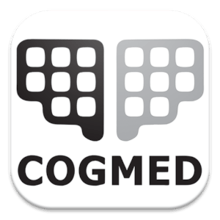Cogmed
 | |
| Private | |
| Industry | |
| Fate | Acquired by Pearson Clinical Assessment Group |
| Founded | 2001 in Stockholm, Sweden[1] |
| Founders |
|
| Headquarters | Stockholm, Sweden[3] |
| Products | Cogmed Working Memory Training |
| Website |
cogmed |
Cogmed is a working memory and attention training program developed by Torkel Klingberg, a professor of cognitive neuroscience at the Karolinska Institutet of Stockholm Brain Institute.[4][5][6]
History
In 1999, cognitive neuroscience professor Torkel Klingberg proposed a computer training program designed to improve working memory in children with attention deficit hyperactivity disorder (ADHD).[7] The resulting program, today named the Cogmed Working Memory Training, is based on the concept of neuroplasticity, the idea that it is possible to produce physical changes in the brain through behavioural or environmental influence.[8]
Following early testing based on Klingberg's research, Cogmed was founded in 2001 at the Karolinska Institutet in Stockholm.[1] Reported initial results were promising, particularly Klingberg's finding that after five weeks of training, 12 of the 20 unmedicated ADHD children tested no longer met the clinical criteria for ADHD.[9]
The sale and use of Cogmed training on Europe and the United States continued. This growth included expansion into treatment for other impairments of working memory, such as persons with learning disabilities, and victims of stroke or other traumatic brain injury.[10]
In 2010, Cogmed was purchased by Pearson Education and became a part of the Pearson Clinical Assessment Group.[11][12]
Reception
Cogmed's products are designed to impact working memory, which some studies have shown is both key to attention and learning, and is commonly impaired in individuals with ADHD.[4] The company claims that its training produces long-term improvements in working memory, resulting in reduced cognitive failures in daily life as well as lasting behavioural outcomes.[13][14] However, there is no agreement in the research community on whether these claims can be substantiated. Some researchers question whether the benefits of training can be generalized to everyday tasks and retained over the long term. A meta-analysis of 23 research studies on seven different commercial and non-commercial working memory training techniques (including Cogmed)[15] found that "working memory training programs give only near-transfer effects, and there is no convincing evidence that even such near-transfer effects are durable." Another review of Cogmed[16][17][18] argued that many of the problem-solving or training tasks presented in Cogmed are not related to working memory, that many of the attention tasks are unrelated to ADHD, and that there is limited transfer to real-life manifestations of attention deficits, concluding "The only unequivocal statement that can be made is that Cogmed will improve performance on tasks that resemble Cogmed training."
The company is generally more positively received in popular media, receiving attention both for their business growth and for the training program itself.[11][14][19] Other press is less favourable, including a 2013 The New Yorker magazine article flatly stating that brain training games are "bogus."[10][20]
References
- 1 2 Pearson Education. "Cogmed Working Memory Training | Cogmed Research Timeline". cogmed.com. Retrieved 2015-05-26.
- ↑ Pearson Education. "Cogmed Working Memory Training | History". cogmed.com. Retrieved 2015-05-26.
- ↑ "Training". aworkingmind.com. Retrieved 2015-05-26.
- 1 2 Sinha, Gunjan (2005-07-11). "Training the Brain". scientificamerican.com. Retrieved 2015-05-26.
- ↑ Torkel Klingberg. "Torkel Klingberg". Klingberg lab. Retrieved 2015-05-26.
- ↑ Torkel Klingberg (2014-03-18). "Torkel Klingberg". pearsonclinical.co.uk. Retrieved 2015-05-26.
- ↑ Klingberg, Torkel; Forssberg, Hans; Westerberg, Helena (1 September 2002). "Training of Working Memory in Children With ADHD". Journal of Clinical and Experimental Neuropsychology (Neuropsychology, Development and Cognition: Section A). 24 (6): 781–791. PMID 12424652. doi:10.1076/jcen.24.6.781.8395.
- ↑ Doidge, Norman (2007). The Brain That Changes Itself: Stories of Personal Triumph from the frontiers of brain science. New York: Viking. ISBN 978-0-670-03830-5.
- ↑ Klingberg, T; Fernell, E; Olesen, PJ; Johnson, M; Gustafsson, P; Dahlström, K; Gillberg, CG; Forssberg, H; Westerberg, H (February 2005). "Computerized training of working memory in children with ADHD--a randomized, controlled trial". Journal of the American Academy of Child and Adolescent Psychiatry. 44 (2): 177–86. PMID 15689731. doi:10.1097/00004583-200502000-00010.
- 1 2 Michael Fitzgerald (2014-10-09). "Do brain games work?". The Boston Globe. Retrieved 2015-05-26.
- 1 2 Melissa Healy (2011-06-14). "Memory training improves intelligence in some children, report says". latimes. Retrieved 2015-05-26.
- ↑ Pearson Education (2010-10-12). "Thousands Transform Academic, Personal and Professional Lives With Cogmed Working Memory Training". pearsoned.com. Retrieved 2015-05-26.
- ↑ "Cogmed Claims and Evidence" (PDF). cogmed.com. Pearson Education. 2014-06-18. Retrieved 26 May 2015.:5
- 1 2 Katherine Ellison. "Your ADHD Brain -- Only Stronger". ADDitude Magazine. Retrieved 2015-05-26.
- ↑ Melby-Lervag M, Hulme C; Hulme (2012). "Is Working Memory Training Effective? A Meta-Analytic Review". Developmental Psychology. 49 (2): 270–291. PMID 22612437. doi:10.1037/a0028228.
- ↑ Shipstead, Z; Hicks, K; Engle, RW (2012). "Cogmed working memory training: Does the evidence support the claims?". Journal of Applied Research in Memory and Cognition. 1 (3): 185–193. doi:10.1016/j.jarmac.2012.06.003.
- ↑ Redick, TS; Shipstead, Z; Harrison, TL; Hicks, KL; Fried, DE; Hambrick, DZ; Kane, MJ; Engle, RW (May 2013). "No evidence of intelligence improvement after working memory training: a randomized, placebo-controlled study.". Journal of experimental psychology. General. 142 (2): 359–79. PMID 22708717. doi:10.1037/a0029082.
- ↑ Chooi, Weng-Tink; Thompson, Lee A. (November 2012). "Working memory training does not improve intelligence in healthy young adults". Intelligence. 40 (6): 531–542. doi:10.1016/j.intell.2012.07.004.
- ↑ Hurley, Dan (31 October 2012). "The Brain Trainers". nytimes.com. Retrieved 2015-05-26.
- ↑ Gareth Cook (2013-04-05). "Brain Games are Bogus - The New Yorker". The New Yorker. Retrieved 2015-05-26.